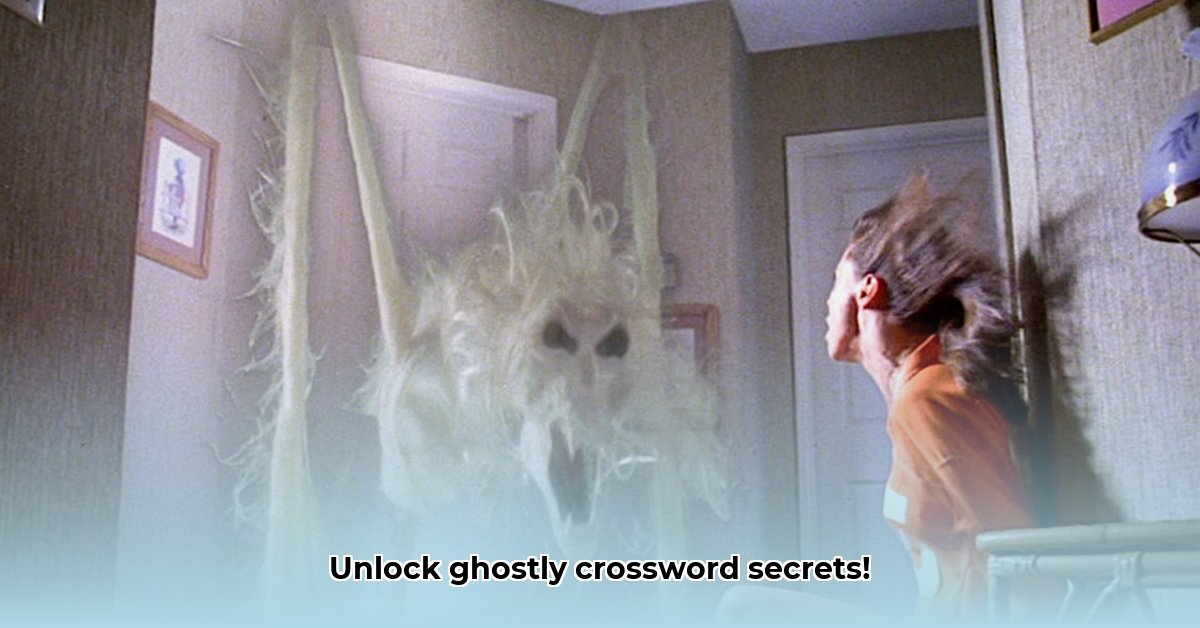Have you ever gotten stuck on a crossword clue about those pesky, furniture-flinging ghosts? It’s a surprisingly tricky thing, finding just the right words to capture the essence of a poltergeist in a few short squares. For more ghost-related crossword help, check out this helpful resource: Ghost Crossword Clues. This article explores that challenge, examining the connection between cryptic crossword clues, the supernatural, and the films that popularized the word “poltergeist.” We will dissect how crossword puzzle creators capture the spirit of these mischievous entities and how the Poltergeist films shaped our understanding of what a poltergeist really is. Prepare for a journey into the spooky world of supernatural wordplay and cinematic scares!
Unraveling the Mystery of Supernatural Activity: The Poltergeist Crossword Clue
Have you ever stared at a crossword clue and felt a shiver down your spine, particularly when the clue alludes to something as spooky as a poltergeist? Let’s delve into the shadowy world of crossword construction and its approach to representing these mischievous spirits. It’s a captivating combination of concise language and the rich imagery of paranormal phenomena.
Cracking the Code: Common Approaches to Poltergeist Crossword Clues
Think of a crossword constructor as a linguistic conjurer, distilling the essence of a poltergeist into a few letters. The simplest clues often employ synonyms: “ghost,” “spirit,” or “specter”—direct and fitting within the puzzle’s grid. But where’s the challenge in that? A truly clever clue hints at more than just the word itself, suggesting the spirit’s mischievous nature. Clues like “Household havoc” or “Furniture mover” evoke the image of flying objects and slamming doors, forcing you to think beyond the obvious. The space constraints within a crossword demand incredible precision in the clue’s wording.
Cultural Landmarks: From Celluloid to Crossword, The Poltergeist Films
The Poltergeist films are more than just horror movies; they’re cultural touchstones. Each film offers a unique take on the poltergeist, blurring lines between childish wonder and bone-chilling terror. Is it a trickster? A malevolent force? Or something more complex? The answer evolves with each installment. The original Poltergeist sets the stage, blending thrills with family drama. Subsequent movies explore deeper themes—family trauma, societal reactions to the paranormal, and the disturbing intersection of technology and unseen forces. This complexity contrasts with in a crossword clue where brevity is key.
Film Making: The Puzzle and the Picture
So, why the difference? A crossword clue is a study in compression, capturing the soul of a word. Movies, however, paint on a larger canvas, building worlds and exploring the psychological impacts of the supernatural, societal responses to the unexplained, and even how technology interacts with or amplifies the paranormal.
Think of a crossword clue as a single brushstroke, while the film is a vast, detailed painting. Both represent the idea of a poltergeist, yet their methods differ dramatically. The rich narratives of the Poltergeist films shaped public understanding of poltergeists, influencing how crossword constructors approach their clues. Each medium offers a unique perspective: wordplay in one, intricate storytelling in the other.
Inventive Approaches to Paranormal Activity: Crafting a Challenging Poltergeist Crossword Clue
Let’s explore how to create a challenging poltergeist clue that goes beyond synonyms. How would you capture that unnerving feeling of unseen forces?
Consider these approaches:
| Clue Type | Example | Difficulty Level | Potential Pitfalls |
|---|---|---|---|
| Synonym with a Twist | “Nocturnal nuisance” | Medium | Requires familiarity with less common synonyms |
| Descriptive Phrase | “Unseen force causing household chaos” | Medium-Hard | Can become too lengthy for a crossword clue |
| Cryptic Clue | “Spooky sounds, things moving—very unsettling!” | Hard | Dependent on solver’s understanding of cryptic hints |
| Thematic Clue (Film-related) | “Young girl haunted in suburban home” | Hard | Requires specific knowledge of the film series |
This table highlights different clue styles and their varying difficulty levels. The cryptic clue relies on wordplay, making it more demanding. The thematic clue, pulling from the Poltergeist movies, needs familiarity with the franchise.
The Enduring Mystery of Wordplay
Our exploration of the poltergeist crossword clue reveals an interplay between concise wordplay and expansive cinematic storytelling. Both mediums reflect our fascination with the supernatural, the unexplained, and the thrill of a mystery solved—through finding the right word or uncovering paranormal secrets. Perhaps when you encounter a poltergeist clue, you’ll appreciate the artistry behind it.
How to Create Nuanced Poltergeist Crossword Clues Inspired by Film Interpretations
Key Takeaways:
- Crossword clues, especially cryptic ones, demand brevity while capturing the essence of a concept.
- The Poltergeist film franchise offers multiple interpretations of the titular entity, providing rich material for clue creation.
- Effective clues use wordplay and misdirection, reflecting the unsettling ambiguity of poltergeists in the films.
Unlocking the Mystery: Poltergeist in Crossword Clues
“Poltergeist” is a straightforward word, but how do you craft an engaging clue? A simple definition won’t suffice. We need to tap into cinematic interpretations. The Poltergeist movies are about fear, family, and the unknown.
Consider how the poltergeist manifests in the films. Is it mischievous? Malevolent? A reflection of inner turmoil?
How can we translate these nuances into a concise crossword puzzle clue?
From Screams to Synonyms: Crafting the Perfect Clue
The key lies in creating nuanced poltergeist crossword clues inspired by film interpretations. We can use synonyms that hint at the film’s themes, however, not all synonyms work.
Consider these options:
- “Unseen force causing family chaos”: Alludes to family dynamics in the films.
- “Noisy spirit, a cinematic terror”: Relies on the poltergeist’s reputation.
- “Haunted house resident, a spectral menace”: Emphasizes the setting and threat.
Thematic Depth in Crossword Clues and Puzzle Solving: Beyond the Dictionary
The films explore themes of family, trauma, and the boundaries of reality. These themes can enrich your clues.
Instead of definitions, aim for clues that evoke the feeling of the films. Consider using:
- Figurative language: Metaphors and similes can add layers of meaning.
- Wordplay: Punctuation and word construction can create clever misdirection.
- Allusions: Subtle references to specific scenes will delight dedicated fans.
For example, a clue referencing the clown doll could be a memorable way to hint at the poltergeist.
The best crossword clues are refined through testing. Craft several different clues for “poltergeist,” based on different aspects of the films. Test these clues on friends, fellow puzzle enthusiasts, or online groups. The feedback you receive will highlight what works and what doesn’t. Iteration is key. You’ll likely discover that even small changes can significantly impact the clue’s effectiveness. Remember, the goal is to create a clue that is both challenging and rewarding to solve.
Poltergeist Crossword Clues: Comparative Analysis of Clue Types and Film Tropes
Key Takeaways:
- Poltergeist clues often rely on synonyms like “ghost,” “spirit,” or “specter”.
- Clue brevity necessitates creative wordplay, unlike the expansive narratives of the films.
- The Poltergeist film franchise’s evolution shaped popular understanding of poltergeists.
Decoding the Spectral: Crossword Clue Analysis and Word Associations
Let’s start with the puzzle itself. How do crossword constructors capture the essence of a poltergeist in a mere few words? A poltergeist is a complex entity, embodying mystery, fear, and unexplained events. A crossword clue must be concise, economical, and solvable. So, how do they do it?
Common synonyms
- Good Morning Images to Share with Loved Ones - January 10, 2026
- Handsome Good Morning Message for Him Long Distance to Make Him Smile - January 9, 2026
- Find the Perfect Good Morning Handsome Gif for Him - January 8, 2026










